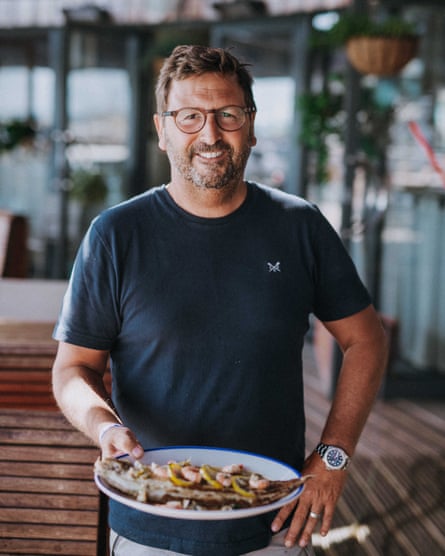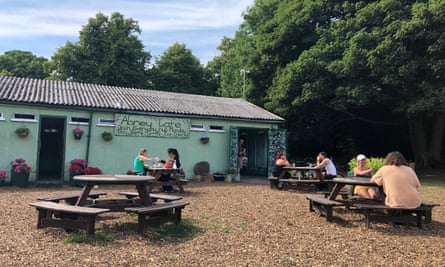
Pubs, restaurants, cafes and hairdressers in England will reopen on 4 July and business owners have been preparing with a mix of excitement and trepidation.
Mitch Tonks, chef-proprietor Seahorse, Dartmouth and Rockfish restaurants
“We’re in the entertainment business,” says chef Mitch Tonks. “We create restaurants so that people can relax and have a wonderful time.
“I said to my team, if the regulations are goggles and masks and gloves, we will not open a single restaurant until that time has passed. I don’t want it to be a functional experience.”
Tonks co-owns the award-winning Seahorse in Dartmouth, Devon, and eight Rockfish restaurants across the south-west of England.

Last week he had a group Zoom call with Boris Johnson to talk about the challenges facing rural businesses: “We were all saying the same thing: we are used to looking after people. Just let us do that.
“I felt like he was listening. He was very interested to hear what we had to say. My thing was: you need to tell people they can go back to pubs and restaurants as soon as possible. You need to tell us what the rules of the game are as soon as possible.”
On 4 July, the Plymouth Rockfish will reopen as “the canary” to test customer and staff reaction to the changes he and his team have made. The menu will be written on the paper tablecloths. “We have cards that the guest fills in and hands to the server so it makes it good fun, like a dim sum restaurant.” A watchful “covid monitor” in a white T-shirt will guide customers and clean constantly. Customers on the covered terrace will order and pay via an app. The menu is shorter, to make preparation simpler for the kitchen staff.”
They are aiming to do 80 covers rather than 120. “We are probably not going to be turning tables very quickly so in revenue terms we are going to be looking at half what we normally take.” It’s all about winning back diners’ confidence, he says – and making it a better place for his staff.
The Seahorse will open on 9 July for dinner outdoors: “We’ve created a beach club-type outdoor space on the embankment looking over the river: 24 covers, dinner only, bar selling rosé, chilled music.” Rockfishes in Exmouth, Exeter and Poole will reopen around 20 July. They’ve invested in marquees and stretch tents to protect diners from the unpredictable British summer.
All 174 staff have been on furlough since they closed on 20 March. Tonks has been locked down with three of his five grown-up children in Brixham, next to the fish market that supplies all his restaurants. His daughter Sadie teaches yoga on Zoom and he’s been cooking with his son Ben, a sous chef at the Seahorse.
“There were times of depression. Now I’m euphoric. I used the time to read a lot and establish new habits. I never really had a rhythm to my day in the past. I just got up and went to work early all day. I really have loved the time. It’s been a chance for the world to pause. You just can’t overestimate those benefits.”

Lawrence D’Lima, 40, publican, west London
“It’s been fraught over the last few months,” said D’Lima, who runs a pub close to Heathrow airport, near Hounslow. “I’m looking forward to seeing everyone and doing a job and service that I love, but I’m apprehensive as to how I’ll survive.”
With his trade closely related to that of the airport, which will not return to full capacity for some time, the landlord said that government support schemes have only allowed him to stay afloat without earning an income.
From next week, customers will be greeted at the door and directed to tables but he expressed fears that some people may not be comfortable sharing their details with him, as mandated.
“I wouldn’t want to give my personal details to strangers,” D’Lima said. “But we’ll have to, though we’re unsure about how to quite to do it. We’re seeking advice from the brewery.”
And he questioned how any pub could be profitable if they needed to be full to do so. “Strict guidelines might mean having to turn people away if we’re busy and that’s not what anyone wants.”
He is looking forward to the reopening, but still laments the closure of pubs in the first place: “A sensible environment for people to responsibly drink was taken away.”
Peter Borg-Neal, founder of Oakman Inns, south-east and Midlands
When the lockdown hit, nearly all of Borg-Neal’s 984 staff were furloughed but most are now preparing to return for the grand reopening on 4 July.
Even so, he says, reopening with restrictions on capacity due to physical distancing is a voyage into a perilous unknown.
“We’re better suited than most because we have big pubs with a lot of tables and it’s sit-down oriented. We’re not in London and we’ve got big gardens. But I see it being a slower recovery for some parts of London and cities.
“Even for me it’s a hell of a worry that we’ll have enough sales to make the business model work. Our sales will be down, with capacity at 70%, but our labour costs won’t go down because we have a more complex operation now, with table service and more money on cleaning.”
Precautions such as these are one reason why he thinks the government should look to ease restrictions further. “Pubs are safer than what’s happening now, with people gathering in public places with booze, with no toilets, no hand sanitiser and so on.
“The restrictions are understandable but we don’t know how necessary they are. We operated until 20 March and not one of my employees caught Covid-19. We had implemented extra cleaning and hand sanitiser.
“If we can show quickly that everything is working well and there isn’t a spike in cases, they could ease restrictions so that other jobs can be saved.”
Borg-Neal fears parts of the pub industry will not survive but says the government has options available to save jobs in the hospitality industry. “The biggest single thing they could do is to get rid of VAT on food. That would also save much of the restaurant business, which is run on very tight margins.”
Priti Sachdeva, 25, cake shop owner, Oxford
Sachdeva is nervous about reopening next week. The shop and cafe had not been open long and was only beginning to become successful before being forced to close. “There’s a lot of anxiety around, it won’t be the same,” she says.
“There’s still a lot of fear, especially for the elderly and before lockdown it was mostly older people who would come into the cafe.”
Describing lockdown as “nerve racking”, Sachdeva says she started a takeaway cake service but had to stop as there weren’t enough regular orders – leading to high wastage – and that she was worried about footfall.
The cafe normally has seating for about 24 people, including some outside space, but Sachdeva – who secured a grant from one of the government’s schemes – thinks she will have to reduce that by half to follow the 1-metre distancing rule.
And she is acutely aware of risk for business owners. “You need a high footfall to get back on track and see any profits, and then there’s the fear of a second wave,” she says. “I am concerned about my safety, but we can’t afford not to open.”
Ryan Fox, 46, hairdressing consultant, central London
“We’ve had to create a priority booking list,” says Fox, of his main clients. “Everyone wants an appointment on the first day back.”
He says that the salon struggled to get support throughout the lockdown and eventually received a bounce-back loan. Now, attention has turned to making everything as safe as possible.
“We’ve looked at what nurses wear, since we touch the head, and have gone for visors, gloves, aprons and masks as a standard, with the client also wearing a mask, a freshly laundered gown and shoe covers.” Staff and clients will also have a temperature test, he adds.
However, Fox believes the government would have been wise to allow the return of salons and barbers earlier – due to the huge demand for haircuts.
“Everyone is desperate for a haircut and some hairdressers have been breaking the rules. The longer the government left it, the more they pushed it underground,” he says.
Alex Scrimgeour, chief executive, Côte restaurant chain
In just over a week during March, Côte transformed itself from a 96-strong brasserie chain to a home delivery service. As lockdown kicked off, 100 staff started creating ready meal versions of customer favourites including beef bourguignon and chocolate mousse, and set up online sales of wines, fresh meats and cheese.
Alex Scrimgeour, the chief executive of Côte, says they have taken thousands of orders, and have also had inquiries from supermarkets and others wanting to take on the range. But the initiative has made only a small contribution to offsetting the closure of Côte’s restaurants for three months. The vast majority of its 3,000 staff have been on furlough as the group battles to stay afloat.
Scrimgeour says it will take time to bring staff back. “People’s habits have changed in lockdown. I don’t think the minute restaurants open they will be filled with people coming in the same numbers as before.” He believes the elderly, vulnerable and those who are just afraid will take some persuading to return.
Just three of Côte’s restaurants will open on 4 July – in Kingston, Chiswick and Windsor – as the group tests demand and new ways of working with about 30% less capacity.
Scrimgeour says government guidance is vague and leaves questions about the details of operating. “A lot of things are not thought through, and it’s going to be very challenging,” he says.
More restaurants will gradually reopen through July and August but Scrimgeour says it is “up in the air” whether all 96 outlets will finally reopen. “It depends on trade and conversations with landlords,” he says.
“The government has done an excellent job of terrifying the consumer,” he says. “It is going to take a long time to heal.”
Paul Joliffe, 54, campsite warden, Dorset
Joliffe says he was given the go-ahead to reopen on Tuesday. “There’ll be lots of maintenance work, grass and hedge cutting to be done.”
He and his wife, Sharon, did not qualify for the furlough scheme as they work seasonally and were set to take up their new job at the beginning of April.
To make ends meet, while receiving jobseeker’s allowance, Joliffe applied for at least three jobs a week and renewed his forklift licence. But he could not find a job until this week, and now, like delayed buses, two have come at once.
“It’s taken me all this time to get a part-time cleaning job in a supermarket and now I don’t need it,” he says, adding that he was looking forward to returning to work outdoors.
“Its bit of a godsend now, as we were thinking if lockdown went further into the season, everything would have taken a big turn. So it’s a good result today.”
Kate Peacock, 42, cafe owner, Stockport
While all cafes can reopen from the first weekend of July, many of those with outdoor areas have been serving drinks and snacks for several weeks.
“We pulled ourselves up by the bootstraps, worked 19-hour days, created an NHS flower display, cracked the tunes on and smashed it to best of our ability,” says Peacock.
Being forced to close at the beginning of lockdown was distressing for her, since the cafe is not just a business but the bedrock of a community.
“People are still saying ‘We’re so delighted to see you back Kate, it’s like a sense of normality returning’,” she says, adding that she plays Bob Marley’s track Three Little Birds about 20 times a day.
“The fact my music is on, the doors are open and kids can enjoy an ice-cream, it makes people realise everything is going to be all right in the end.”



